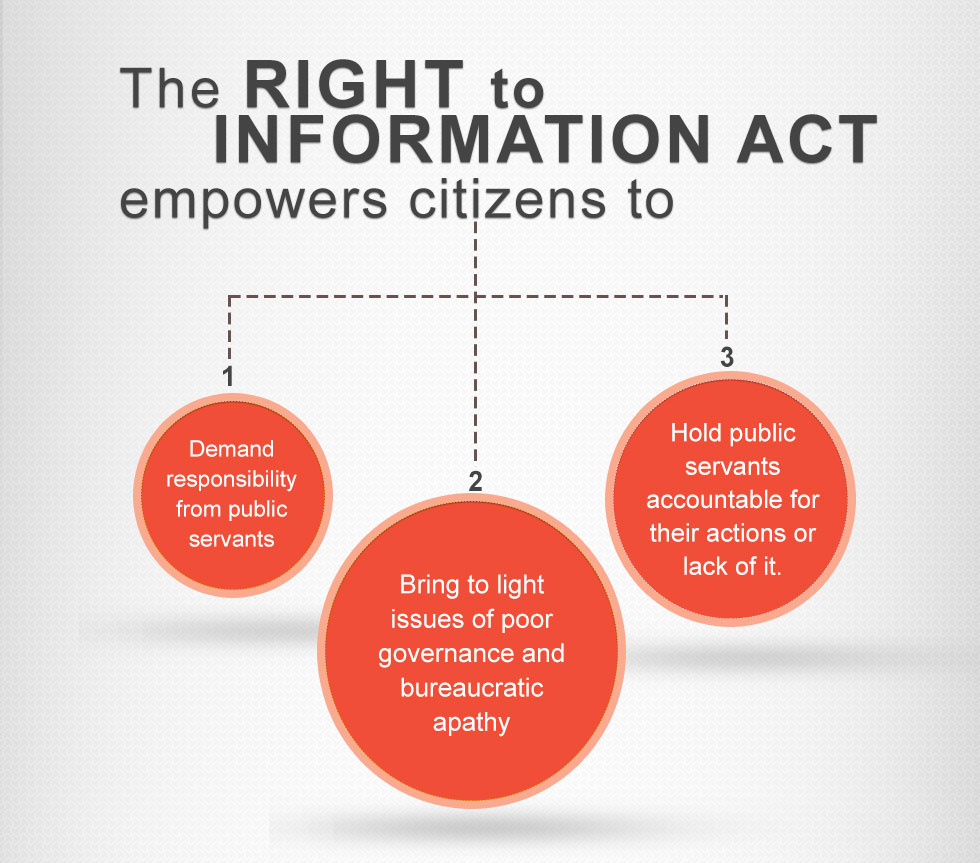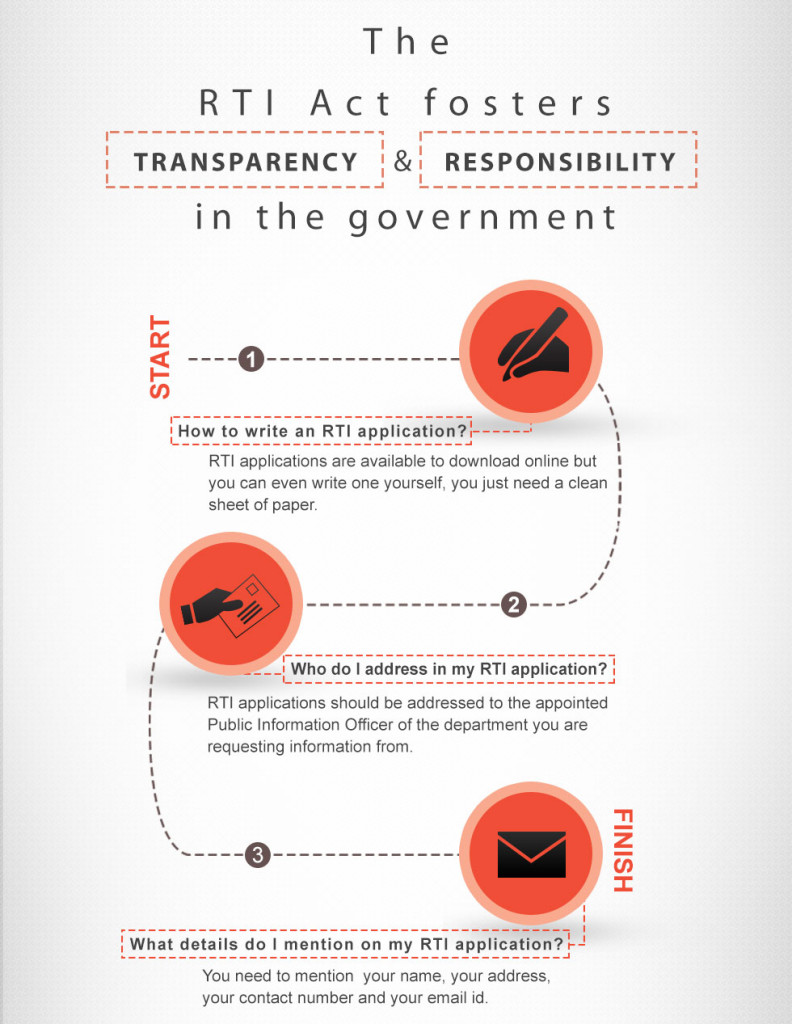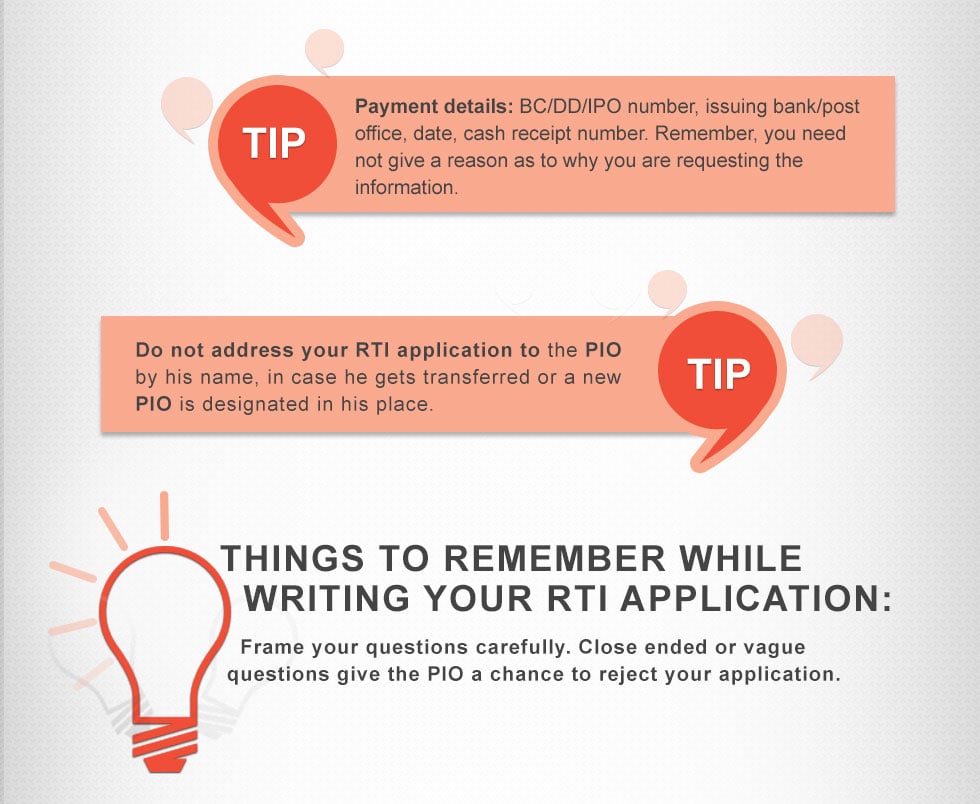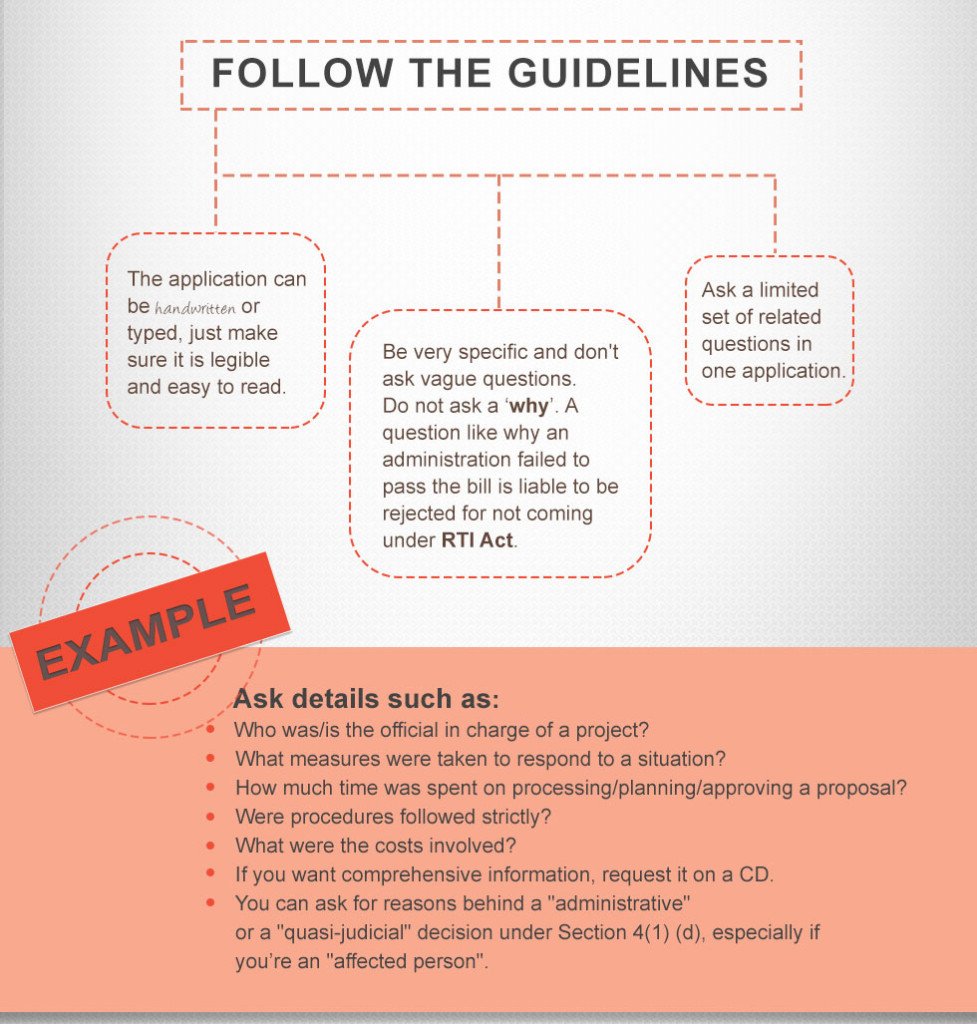How to file an RTI plea?- Step By Step Procedure
The Act prescribes a simple procedure to obtain information. Though some public authorities have their own formats, there is no compulsion to stick to the prescribed format
Step 1: Identify the department you want information from. Some subjects fall under the purview of State governments or local authority such as the municipal administration/panchayat, while others are handled by the Central government
Step 2: On a sheet of white paper, write out the application by hand, or type it, in English, Hindi or the official language of the area. You can also ask the public information officer to put it in writing
Step 3: Address the application to the State/Central Public Information Officer. Write the name of the office from which you seek information, and the complete, correct address. Clearly mention ‘Seeking information under the RTI Act, 2005’ in your subject line
Step 4: State your request in the form of specific, detailed questions, and mention the period/year your request falls into. Ask for documents or extracts of documents, if required. To obtain documents, the applicant has to make a payment of Rs. 2 per page
Step 5: Pay Rs. 10 to file the plea. This can be done in the form of cash, money order, bank draft or a court fee stamp. The stamp should be affixed to the application. Applicants below the poverty line (BPL) need not make the payment but have to attach a copy of the BPL certificate along with the application
Step 6: Provide your full name and address, contact details, email address and sign the application clearly. Put in the date and the name of your town
Step 7: Take a photocopy of the application and keep one with you for future reference. Send your application by post or hand it in personally to the department concerned. Don’t forget to get an acknowledgement
Step 8: The law mandates that information be provided in 30 days. If this does not happen, you can file an appeal. The first appeal should be addressed to ‘The Appellate Authority’ with the name of the department and the address. The appellate authority is mandated to revert in 30 days from the date of receipt of the appeal. If the Appellate authority fails to reply, further appeals lie with the Information Commission, the Chief Information Commissioner, State/Central Information Commission.
Complete Information On RTI and It's Filing Procedure
What is RTI?
The Right to Information(RTI) Act 2005 provides for setting out the practical regime of Right to Information for citizens to secure access to information under the control of public authorities, in order to promote transparency and accountability in the working of every public authority.
When did RTI Act come into force?
The Central Right to Information (RTI) Act came into force on the 12th October, 2005. However, before that 9 state Governments had passed state Acts. These were J & K, Delhi, Rajasthan, Madhya Pradesh, Maharashtra, Karnataka, Tamil Nadu, Assam & Goa.
What does the Act aim to do?
The Act aims at promoting transparency and accountability in the working of every public authority
Who does the Act apply to?
The Act extends to the whole of India, except the state of Jammu and Kashmir
Who is covered under RTI?
Rights available under RTI
- Ask any questions from the Government or seek any information.
- Take copies of any government documents.
- Inspect any government documents.
- Inspect any Government works.
- Take samples of materials of any Government work.
- Who is covered under RTI
The Central RTI Act extends to the whole of India except the State of Jammu and Kashmir. All bodies, which are constituted under the Constitution or under any law or under any Government notification or all bodies, including NGOs, which are owned, controlled or substantially financed by the Government are covered.
Who will give you information about RTI?
One or more existing officers in every Government Department have been designated as Public Information Officers (PIO). These PIOs act like nodal officers. You have to file your applications with them. They are responsible for collecting information sought by you from various wings of that Department and providing that information to you. In addition, several officers have been appointed as Assistant Public Information Officers (APIOs). Their job is only to accept applications from the public and forward it to the right PIO.
Requirements for Filing an RTI form
Records, documents, memos, mails, opinions, advices, press releases, circulars, images or any other computer-generated material, orders, log books, contracts, reports, papers, samples, models or data material held in electronic form.
Applicants will incur fees and costs that include, but may not be limited to the following.
Procedure for Appeal
Procedure for first as well as second appeal in case the applicant fails to receive RTI information within the scheduled period. This also applies to those cases where satisfactory information is not provided. Here is an overview of the appeals procedure:
As an applicant, an appeal has to be filed with the relevant first appellate authority within 30 days of the date that was the last day of the expiry of the 30 day time period. The appeal is to seek information.
Your appeal will be reviewed and disposed within 30 days of receipt or 45 days in ‘exceptional cases’.
As an applicant, if your appeal is not disposed or you are still left unsatisfied, you can file a second appeal to the Central Information Commission. This appeal must filed be within 90 days from the date that was the last day of the 30 or 45 day time period of the first appeal.
For PIO to reply to an application 30 days from date of receipt of application
For PIO to transfer to another PA under Sec 6(3) 5 days from date of receipt of application
For PIO to issue notice to 3rd Party 5 days from date of receipt of application
For 3rd Party to make a representation to PIO 10 days from receipt of notice from PIO
For PIO to reply to an application if a 3rdParty involved 40 days from date of receipt of application
For applicant to make First Appeal 30 days from date of receipt of PIO’s reply or from date when reply was to be received
For First Appellate Authority to pass an order 30 days from receipt of First Appeal OR
Maximum 45 days, if reasons for delay are given in writing
For applicant to make Second Appeal before CIC/SIC 90 days from receipt of First Appeal orders or from the date when orders were to be received
For CIC/SIC to decide Second Appeal No time limit specified
Read Also How To Apply For Voter ID Card Online
Authorities exempt from the RTI
The Second Schedule of the RTI Act exempts certain Public Authorities under the Central Government from disclosure of information.
- Intelligence Bureau (IB)
- Research and Analysis Wing of the Cabinet Secretariat
- Directorate of Revenue Intelligence
- Central Economic Intelligence Bureau
- Directorate of Enforcement
- Narcotics Control Bureau (NCB)
- Aviation Research Centre
- Special Frontier Force
- Border Security Force (BSF)
- Central Reserve Police Force (CRPF)
- Indo-Tibetan Border Police (ITBP)
- Central Industrial Security Force
- National Security Guards
- Assam Rifles
- Sashastra Seema Bal (SSB)
- Directorate General of Income-tax (Investigation)
- National Technical Research Organisation
- Financial Intelligence Unit, India
- Special Protection Group
- Defence Research and Development Organization
- Border Road Development Board
- National Security Council Secretariat
- Central Bureau of Investigation (CBI)
- National investigation Agency (NIA)
- National Intelligence Grid (NATGRID)
Penalty Provisions Under RTI
The CIC or the SIC can impose a penalty on the PIO, while deciding on a complaint or a second appeal. Penalty can be imposed if the PIO has:
- Refused to receive an application.
- Not furnished the requested information within 30 days of receiving the application
- Denied the request for information
- Knowingly given incorrect, incomplete or misleading information
- Destroyed information, which was the subject of the request
- Obstructed in any manner, in furnishing the information
The amount of penalty shall be Rs.250 per day till the information is furnished or the application is received, subject to a maximum of Rs.25,000. The penalty has to be paid by the PIO from his salary and not by the Public Authority. The CIC or the SIC will give the PIO a reasonable opportunity to be heard before the penalty is imposed. However the burden of proving that he acted reasonably shall be on the PIO.
The First Appellate Authority (FAA) or the Public Authority (PA) are not subjected to any penalty clause under the RTI Act.




Few Tips on RTI filing by K. Sanjaya Kumar, chapter coordinator, 5 Pillar, Pallavaram Chapter NICA: 154582301
1) A court fee stamp is the easiest to acquire. Bank drafts and postal orders take time
2) Send in your application by registered post as this will enable you to receive an acknowledgement of the receipt. Keep the acknowledgement safely
3) In your application, state that the information be provided to you in written form, and sent by registered post
4) Ensure your questions are all related to the subject at hand, and that they are to-the-point
5) If the information sought by you is handled by more than one department, it is mandatory for your application to be forwarded to the other departments concerned. The recipient of your application should intimate you of the forwarding, and the other departments should provide the information within 30 days of the receipt of the application
[buttons style=”success” size=”lg” icon=”fa-check”]How To Apply For Voter ID Card Online- Step By Step Answer[/buttons]
[divider scroll_text=”Back To Top”]
